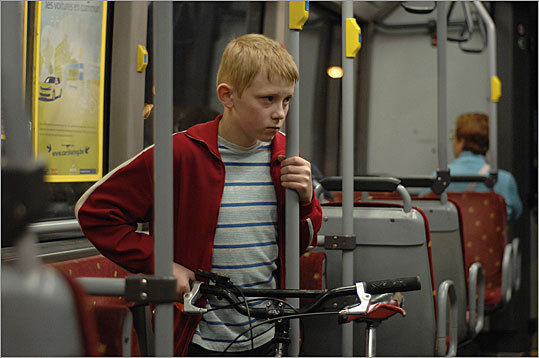

Director: Jean-Pierre Dardenne and Luc Dardenne, 2011 (PG-13)
A recent movie I saw at the cinema (Philomena) focused on a mother desperately searching for her son. In this film, we find a boy desperately searching for his father. Both are poignant dramas. Both were nominated for awards (Philomena in 2013, Kid with Bike in 2011). But there is where the similarities end. Kid with a Bike is a French movie from the Dardenne brothers, that plays out in slow fashion, quite the opposite of a typical Hollywood film. Refusing to use a musical score to pluck the viewer's emotions, the Dardennes use a powerful device to catch attention. Four times they play a 15 second segment of Beethoven's Emperor Concerto, almost the only music in the film, and in so doing force us to see the bigger picture and transitions of the film.
Kid with a Bike opens with the kid, Cyril (Thomas Doret) without a bike. More than this, though, he is a kid without a father. We meet Cyril at the group home his father has dumped him in. As an 11 year-old, Cyril needs his father, and wants the bike his father still has. So he goes searching for his dad. He ends up in a doctor's office being chased by the director of the foster home. He grabs hold of a woman, Samantha (Cecile De France), to avoid being taken back. This is Samantha's first brief and unexpected encounter with Cyril.
After this meeting, and having witnessed Cyril's passionate desire to get his bike back, Samantha buys it back for him and delivers it to the foster home. On a whim, Cyril asks her if she will let him stay with her on the weekends. Surprisingly, she agrees. This sets up the context for the rest of the film.
The Dardenne brothers show normal life for this hairdresser and her weekend foster child. He embarks on a quest to find his father. He also encounters a bully who leads him into a gang whose leader seduces him toward a criminal life. Along the way, minor violence occurs which forces both Cyril and Samantha to face up to the consequences of Cyril's choices.
Several themes emerge. First, Cyril's father refuses to take him back: "It's too much. I can't look after him." Further, he refuses to tell Cyril the truth, cowardly trying to make Samantha tell Cyril this unwanted news. Here is a father who walks away from his responsibilities. Is there a smaller coward than this? Becoming a father is a small act that bears huge consequences. A man who fathers a child must act like a father. To do otherwise is a violation of familial function. There is no excuse. A man must think before he acts, and count the cost of his intended actions (Lk. 14:28).
Cyril, on the other hand, acts like a child would. He needs his father. He desperately wants someone there for him. (We never know about his mother.) Cyril even goes out of his way to give his father what he seems to want in hope that he will want his son back. He simply does not understand how his father could not want him, could discard him like a used wrapper. God has shown us what a father should be, in his role as our father. He has also told us, "Fathers, do not embitter your children" (1 Col. 3:21). As a father, I can and do make many mistakes. But failing to love my children, even abandoning them, would be the way to most embitter them. It is perhaps the worst thing a father could do.
 Finally, Samantha the hairdresser begs the question, why. Why would she take on a stranger, particularly a very troubled boy? She did not count the cost. And there was a cost to her: emotional, relational, physical and even financial cost. Why would she do this? The Dardennes never give us a clear answer, although she seems almost as needy as Cyril.
Finally, Samantha the hairdresser begs the question, why. Why would she take on a stranger, particularly a very troubled boy? She did not count the cost. And there was a cost to her: emotional, relational, physical and even financial cost. Why would she do this? The Dardennes never give us a clear answer, although she seems almost as needy as Cyril.Yet Samantha reminds us of another parent who took on troubled children: God. Yet, he did count the cost and realized it would be huge: it cost him his only son. "While we were still sinners, Christ died for us" (Rom. 5:8). His love changes us from troubled people, caught up in our own issues and sins, to those who become like Jesus, loving others. Selfishness turns to selflessness. Perhaps with Christ central in our lives, we might look to help the Cyrils we run into in our daily lives.
Copyright ©2014, Martin Baggs


No comments:
Post a Comment